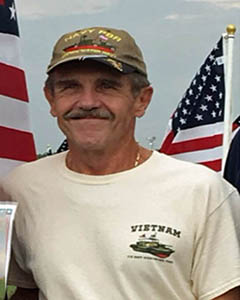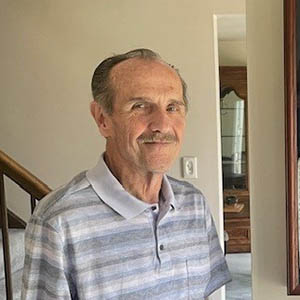Navy Vietnam War Naperville, IL Flight date: 07/24/24
By Charlie Souhrada, Honor Flight Chicago Veteran Interview Volunteer
Growing up as the youngest in his family, Donald “Don” Ramsbottom learned how to leverage speed and agility to excel. These traits proved invaluable during his service in the Vietnam War, allowing him to navigate swiftly through challenging situations and make quick decisions as a boatswain’s mate in the U.S. Navy. In recognition of his service, Don will enjoy a heroes’ welcome as part of Honor Flight Chicago’s 116th flight, July 24.
Born November 2, 1946, in Chicago, Don grew up in the Beverly neighborhood. His father, John, served as an executive with Swift & Company, while his mother, Katherine, kept watch over Don and his two older sisters and older brother.
At Morgan Park High School, Don kept a busy schedule, competing on the school’s track and field and swim teams, while working a night shift stocking shelves at National Food Store. “That was during my junior and senior years of high school. I’d get done with work around 2 a.m. My classes were hard, but I still did well in school, and my schedule never bothered me.”
After graduating from high school in 1964, Don was working as a welder at Chicago Bridge and Iron Works, near Morgan Park when his draft notice arrived. “I was drafted by the Army, but I had the chance to join another service,” he says. “I joined the Navy because I knew how to run boats. I later learned when you join the Navy, you don’t tell them anything!”
In January 1967, Don entered boot camp at Naval Station Great Lakes, intending to become a submariner. After completing boot camp, he was sent to Naval Submarine Base New London, Groton, Connecticut, but changed course after 90 days. “I went on a conventional sub one night and said to myself ‘this is not for me.’ I couldn’t stand being down there!”
Don then asked his commanding officer, “How do I get out of this submarine stuff?” and was told “You’ve got to flunk out!” Taking that advice, he started intentionally fouling things up every chance he got. “They were so upset with me they said, ‘This guy knows how to run boats … send him to Vietnam!’” And that’s exactly what happened.
After taking additional instruction at Naval Training Center San Diego, Don was sent to Vietnam where he was stationed at Vung Tau in the southern part of the country. There he played an integral role in the “brown water navy,” patrolling rivers and swamps on a “PBR,” or Patrol Boat Riverine for two years. According to the National Museum of the U.S. Navy, PBRs were used during the Vietnam War to combat Viet Cong guerillas in the Mekong Delta. These small, 31-foot-long boats had a crew of four and were used for “stop and search” inspections of junks and sampans, and to assist the Army Infantry. Don explains PBRs typically had one forward machine gun and two aft. Instead, he preferred one gun in the front and one in the back, sacrificing firepower for a lighter, speedier boat.



“The VC used to carry ammunition and supplies down the rivers,” he says. “We’d pull up to fishermen and if they let us board them, we knew they were truly fisherman. If they wouldn’t let us board, I’d tell our crew to ‘open up,’ and their crew would jump out of the boat because they knew it was going to blow!”
During his first six months in-country, Don served on PBR 27. One day, his patrol boat hit a submerged mine, killing his three crewmates and damaging the boat. Don was now a sitting duck and under attack. “I opened the .50 caliber machine gun and kept the VC off me, otherwise, I would’ve been a prisoner of war.” Don brought the boat back even though he was wounded. He received a Purple Heart.
Soon after, Don was back patrolling the rivers on a new boat, PBR 45, with a new crew. He remembers the crew always wore shorts and flip flops, and rarely wore helmets, because the weather was usually hot, often 105 degrees. Visibility was difficult if not impossible during rainy season. And, because patrols lasted two weeks’ straight, the crew survived on canned rations left over from WWII. “We had a whole deck full of that junk. Everybody went after the peanut butter because it had some taste left to it,” he says.
In early 1968, after one year on the rivers, Don’s only R & R was cut short by the Tet Offensive. “I was in Sydney, Australia, and the shore patrol came and got me because the Tet Offensive happened and a lot of our guys were killed. They (the Navy) brought me back to Vietnam because I knew the rivers. I was there for another year training new guys.”
At the end of the year, Don was sent back to the U.S. and discovered he had lost more than 40 pounds during his time in the service. “When I got back to San Diego, I learned that I weighed 112 pounds. I lost so much weight because of the stress and poor food.” Before being given his discharge papers, he was fed “a lot” of steaks, told to put on civilian clothes, and went to live with his parents who had moved to New Jersey.
After staying with his parents for a few months, Don moved to Glen Ellyn and enrolled in business classes at College of DuPage. In April 1969, he met his future wife, Helen, at a nightclub. “I was at Pheasant Run with a buddy and he convinced me to meet these two girls.” He explains he sat next to Helen, they started talking, dating and they’ve been a team ever since. They married February 14, 1970, and celebrated their 54th anniversary earlier this year.
In the early ‘70s, while working as a Maytag appliance repairman, Don realized he had a knack for the home appliance industry. Together, the couple opened an appliance store, West Suburban Maytag, and started selling “hundreds” of Amana Radaranges. “We were one of their biggest dealers until the ‘big box’ stores started to come in. Then we decided to close and went into commercial real estate.”
In 1976, the couple moved to Naperville, and still live in their original house where they raised their three children – Wendy, Scott and Todd. About one year ago, Don became “semi-retired” to focus on managing his health and the effects of Agent Orange exposure he incurred while in Vietnam. Nowadays, Helen has taken the lead in managing their commercial buildings while Don helps as much as possible.
He admits he’s excited about his upcoming Honor Flight experience, and that it has brought back memories he’s repressed for years. “Your mind goes there,” he says. “I was there, and I remember it.”
Welcome home, Don, and thank you for your service. We hope you enjoy your Honor Flight!


